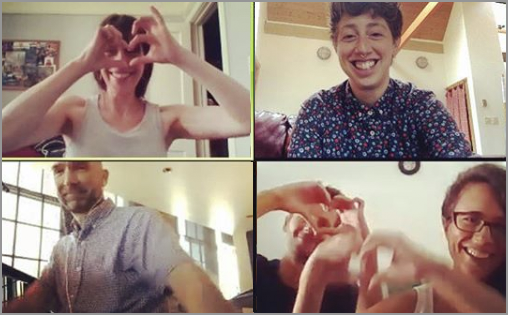How do you handle your haters? I’ve always wanted to be the type of person who drinks the tears of my enemies or who believes that what other people think of me is none of my business. But this is just not who I am, and it’s definitely not who I was before I started taking a leadership role in my own life.
Before I appointed myself CEO of my own multipotentialite path, I used to be the one shedding tears when someone declared themselves my enemy. Even though this anti-bullying website defines haters as “people who use negative and critical comments and behavior to bring another person down by making them look or feel bad,” I was overly invested in what haters thought of me—because I assumed they had more information than I did about who I was (really), or who I was supposed to be.
I have come to terms with the reality that I will never be able to automatically discard everything haters have to say. (Maybe it’s the Enneagram 3 in me…) But I have also realized that haters do not have my best interests in mind. So I have to deal with them skillfully by figuring out what they can do for me.
What role have haters played in your multipotentialite journey? What’s their go-to technique? For example, do they use cutting words to discourage you? This includes passive-aggressive comments that rattle you by making you wonder, Did I just hear what I thought I heard? as well as aggressive-aggressive comments that make you wonder where they learned their manners. Or maybe your haters are unfailingly polite to your face, but sneakily employ gatekeeping techniques to deny you permission from pursuing a multipotentialite lifestyle. What is their deal? I came across this fun acronym that might explain their motivation: HATERS stands for Having Anger Towards Everyone Reaching Success. Let’s discuss.
The Hater is overly concerned with your success
Haters are genuinely (and weirdly) obsessed with your success and prosperity, especially with doing whatever they can to stand in the way of it. They may be jealous of the multifaceted life you are creating as a liberated multipotentialite, or of the way that too many things in too many categories seem to come too easily to you. This motivates them to continuously throw up ridiculous, unnecessary, and generally uncalled-for roadblocks full of Haterade intended to slow you down from succeeding at yet another thing.
Or your Hater may see life as a zero-sum game, where they take it personally every time you experience a small victory in crafting the multipotentialite life you dreamed of. Even though you had no idea you were involved in a fight-to-the-death competition against them, Haters interpret each of your small wins as big, personal, and humiliating losses in their own life. In other words, they create you as their own personal Hater, without your consent.
In your more generous moments, you genuinely want to ask the Hater: “Who hurt you?” in order to understand why they feel the need to so consistently declare themselves your enemy. In your less generous moments, you ask other questions and call them other names. But could one of those names be “unknowing and unwilling yet effective helper?” To explore this concept, let’s take a trip into my adventures in academia. Here, scarcity can breed unhealthy competition and ill-informed critique, which allows Haters to proliferate and get away with it by using fancy words to spread the Haterade.
The Hater’s misdirected concern can help you
I once had a professor who told the story of a Hater in the form of a journal article reviewer. This reviewer took great delight in rejecting the professor’s articles every time she submitted one. He would gleefully point out—in painstaking detail—the flaws in every sentence that this professor wrote. It didn’t matter how closely she followed this reviewer’s suggestions for edits; he rejected this professor’s article each and every time.
So, this professor decided on a new strategy. She recruited this reviewer as an unpaid and unknown editor of her work. Confused? Here’s how she did it: she kept submitting her articles to the reviewer, knowing that he would reject them, and he did.
The professor knew that no matter what she did, the reviewer would never accept her article into his journal. However, she had realized that he was rejecting each of her articles by making harshly-worded but excellent suggestions for improvement. So she kept submitting. And after she received each rejection, she made the edits the reviewer had suggested. She then submitted her improved article to a different journal that gladly accepted it. Genius!
Is your Hater an obstacle and an ally?
So as a multipotentialite, are there Haters in your life that you can recast as unknowing and unwilling Helpers instead? After all, if they get to rudely construct you as an unknowing and unwilling adversary in their life, you can reconstruct them as someone who unknowingly acts as an ally in helping you achieve the multipotentialite goals in your life.
I learned how to play with this perspective from the Conscious Leadership Group. They invite us to observe what happens when we stop “seeing other people and circumstances as obstacles and impediments to getting what I most want” and instead start “seeing all people and circumstances as allies that are perfectly suited to help me learn the most important things for my growth.” It doesn’t work in every circumstance, but my life became a lot more fun when I started re-conceptualizing Haters as allies instead of adversaries.
For example, whenever I attended a PhD candidate’s public lecture at my school, I noticed that there was always one Hater who made it their life goal to embarrass the candidate by asking a question they couldn’t possibly answer. I found this outrageous and unfair—and, of course, I took it personally. I started sweating a full three years before my own PhD public lecture, imagining eventually encountering this Hater as a dastardly obstacle and impediment to getting my degree. Whenever I presented seminars, I held my breath until the Hater revealed themselves by asking me a ridiculous, unanswerable question that was infuriatingly often “more a comment than a question.”
How I defeated my Hater
I tried preparing and over-preparing for seminars. Didn’t work. I tried using every moment in the shower to quiz myself on answering the hardest questions I could think of. That also didn’t work, and it made the shower one less place I could find peace and relaxation. Unhelpful! So, eventually I just stopped. Instead, I started a fun game that I now teach to all of my students: Guess Who Brought The Haterade Today.
When I arrive at a lecture or seminar, I scan the room. If I correctly guess who brought the Haterade, I award myself 50 invisible and completely inconsequential points, and I award my Hater the victory of appearing smarter than me. Each time my Hater reveals themselves as The One Who Is Smarter Than Me, I take great joy in describing how much of a Great Question they have asked, and how much I absolutely do not know the answer. Then, I’m free to move on with my seminar and with my life. I tell my students how freeing it is to no longer hide behind a facade of being all-knowing in every facet of academia, because their time is much better spent accepting their true identity as a fellow human just trying to graduate.
What I learned about the real Hater
Looking back, I could say that what I needed to learn in those moments wasn’t my spot-the-hater game. It was that I should stop trying to be the smartest person in the room. But what I needed even more was to get curious about where the pressure to look smart at all times was coming from, since I am absolutely not a competitive person by nature. I’ve already written about the pressure that people who come from groups that have been marginalized in the academy can feel because they are taught that their acceptance to the academy is conditional on consistently performing over and above everyone else at all times and in all areas.
The Hater in my seminar was perfectly suited to help me understand that the most important thing I needed to learn for my growth was to stop letting perfectionism and imposter syndrome steal my joy. As I transitioned from student to staff member at my university, I began to understand that my mission was to defeat the real enemy: unfair expectations and inequitable barriers that keep students marginalized in the academy. That is a mission I gladly accept, because pursuing it brings me closer to living a more authentic life as a leader in the academy.
What can you learn from your Hater?
So my multipotentialite friend, how do you respond to the Haters in your life? What have you learned from them? The real problem with Haters may not be found in the critical words they use to distract or discourage you, but in the ways that their Haterade keeps you from moving closer to self-acceptance.
Your turn
Let’s start a conversation about your Hater in the comments. How have you repurposed criticism from a Hater to help you live a more authentic life as a multipotentialite?

Doing/being/exploring ALL THE THINGS is easier with a community!

Did you know we have a private community of hundreds of multipotentialites from around the world? We support each other, share advice and cheer each other on as we building lives and career around ALL our passions.
Learn more about the Puttyverse and get notified next time we open the doors:


I have found this ability to turn HATERS to my advantage difficult. I would love help in finding the transformational approach. Mostly, I have found any level of ignoring or keep them from use of their passive- aggressive or aggressive – aggressive behavior just leads to them pushing harder and often changing their methodology. Insight into how to improve my interacts would be greatly appreciated.
Hi Jennifer! I can definitely relate to the advice of “just ignore them!” not working for you.
I don’t know enough about your situation to offer advice – please reach out to people who can provide you with real support where you are in the world.
If you want to know a bit more about what has helped me, here are three things I really do:
1. Redrawing my boundaries around the influence and impact of haters. I can’t always (often!) control what they say, but I can do some work to limit when they get to interfere, and/or what I will do with the (often unwanted) information they bring to me.
2. When I find myself caught up in a hater’s latest scheme, actually stopping what I am doing to practice Dr. Kristin Neff’s three elements of self-compassion is compulsory for me.
3. Most recently, I have learned to be increasingly *less* interested in the games that haters play. It really takes the wind out of their sails when I am increasingly bored by their silly (or complex) machinations, no matter how many times they come with new material. I’ve stopped trying to analyze their last move or anticipate their next one. Maybe it’s because I’ve just turned 40, but I’m over it. Genuinely feeling bored by haters feels different to me than pretending that they don’t exist, but your mileage may vary.
Most importantly Jennifer, if it is aggressive-aggressive behaviour that you’re experiencing, this is a safety issue and needs to be taken seriously as such. If this article has helped you realize that this is a problem in your life, please reach out for real, local support so that you do not have to go it alone.